You may think that perfect oral health is achieved by simply brushing and flossing your teeth regularly. While regular brushing and flossing are important, they’re not enough to maintain perfect oral health. The only way to ensure you never suffer from gum disease is to seek regular root planing and scaling treatment.
No matter how well you brush your teeth, you can’t get rid of all the food particles stuck between your teeth. This is especially true if you have slightly misaligned teeth because the food particles can get stuck in deep recesses of your teeth that you can’t reach. Over time, these food particles turn into a white sticky substance known as plaque, and it hardens into a substance called tartar that’s almost impossible to remove on your own.
The accumulated plaque and tartar also invite bacterial infection, which leads to many dental issues, including gum disease and gingivitis.
At Woodshore Family Dentistry, we provide regular dental deep cleaning that also includes scaling and root planing in Clute. Call us today to learn more.
What Is Dental Scaling and Root Planing?
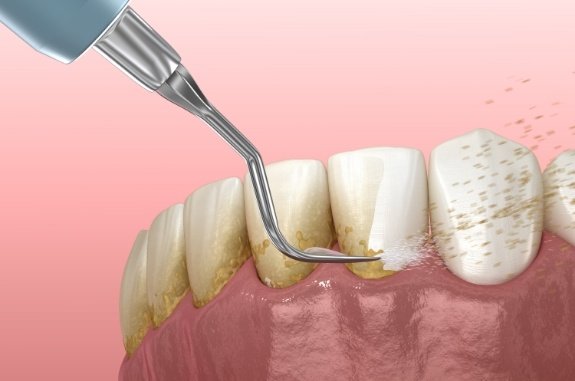
Dental scaling and root planing are the two best non-invasive procedures to either avoid gum disease altogether or treat gum disease before it gets serious. Scaling is a procedure in which the dental hygienist uses a scalar device to remove the accumulated plaque and tartar from the deepest recesses of your teeth.
If there’s a pocket of space between your gums and teeth — caused by gum recession due to excessive tartar — the dentist also uses the root planing procedure to smoothen the root surface and reattach it to your teeth.
Can a General Dentist Perform Scaling and Root Planing?
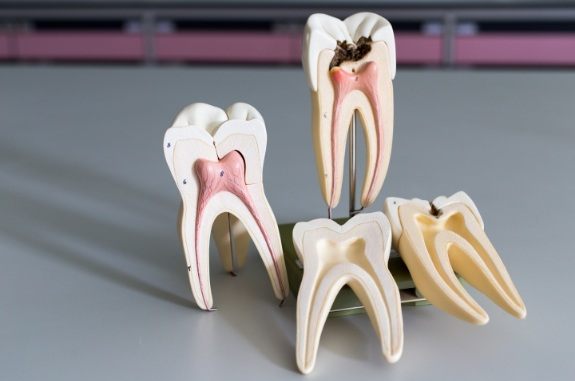
Scaling and root planing are extremely simple procedures. As such, they can be conducted by anyone, including a general dentist or a dental hygienist.
Signs You Need Dental Scaling and Root Planing
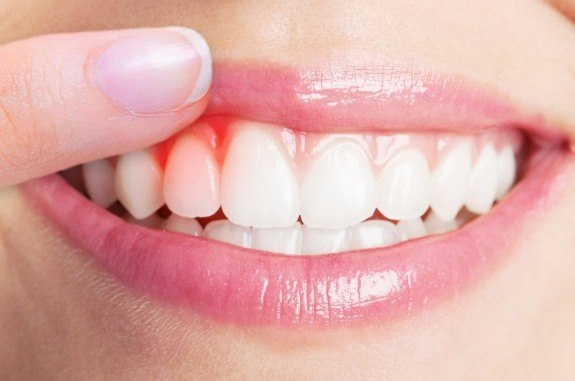
Dental scaling and root planing only work if you seek treatment at the earliest stage of gum disease. If the bacterial infection spreads to your bones, you may need to opt for serious surgical options.
The moment you notice any of the signs and symptoms of gum disease, you should immediately seek treatment. The following are some signs to watch out for:
-
Inflamed or swollen gums.
-
Persistent toothaches.
-
Persistent bad breath, even if you regularly brush your teeth and rinse your mouth.
-
Receding gums, which can be seen as a gummy smile.
-
Sensitive gums that easily bleed even while brushing.
If you don’t seek tooth scaling and root planing in time, you can suffer from advanced periodontitis. When your gums are healthy, they fit tightly around your teeth and there are minimal gaps between them. When you suffer from gum disease caused by a bacterial infection, the pockets of space between your gums and teeth expand. This also further spreads the infection until the bacteria infect your roots and bones. This can eventually lead to bone and tooth loss as well. If you don’t seek dental scaling and root planing procedures, you may later have to opt for surgery or even tooth extraction.
Scaling and Root Planing Procedure
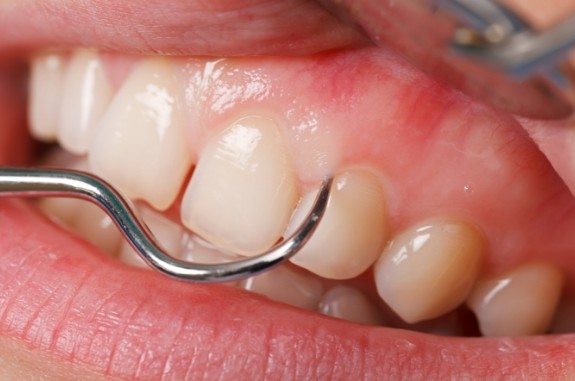
You might be wondering exactly what happens during a scaling and root planing procedure. As you’ll see, these are extremely simple to complete, so you have nothing to be concerned about.
Scaling
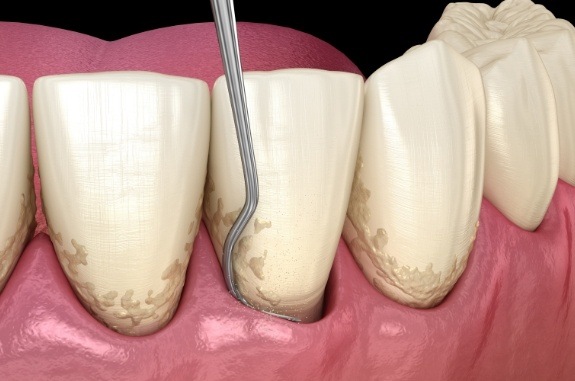
Handled by a dentist or dental hygienist, they will simply use a scalar device to scrape off every last trace of plaque and tartar. They’ll reach into the deepest recesses of your mouth to remove all of the accumulated plaque.
Root Planing
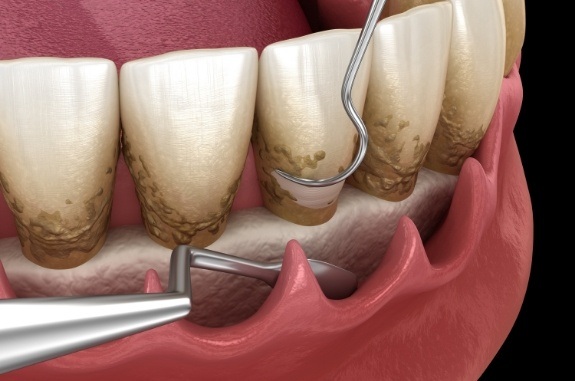
This procedure is only necessary if the gum disease has led to gum recession and there are pockets of space between your teeth and gums. In this case, the dentist will smooth the roots of your teeth, which will also remove the bacteria and accumulated plaque. Once the root is smoothed and disinfected, the dentist will reattach it to your teeth.
What Happens After Scaling and Root Planing?
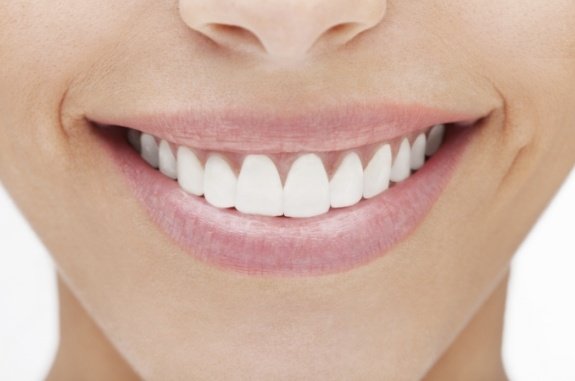
Once the dental scaling and root planing are done, you can simply go back home. You only have to return for dental deep cleaning regularly so that the dentist can continue removing all of the accumulated plaque and tartar.
When you return for a dental cleaning appointment after your scaling and root planing, the dentist will make sure that your gum pockets have healed properly. You won’t need any more root planing if your gums are pink and healthy. However, if the dentist finds that the gum disease continues to spread, they may recommend more advanced surgical treatments.
If everything is healthy, the dental hygienist will simply use the scaling procedure to remove accumulated plaque again and disinfect your mouth with a fluoride solution rinse.
Scaling and Root Planing Cost

The exact tooth scaling and root planing cost depend on the extent of bacterial infection. The cost may range from $1,000 to $3,000, but insurance may cover most of it because it’s a medically necessary procedure.
Oral Health Tips

You can’t simply rely on your routine scaling and root planing procedures. You need to maintain oral health on your own as well. The following tips will help you maintain perfect oral health:
-
Use fluoride-based toothpaste to brush your teeth regularly.
-
Toothbrush bristles tend to waste away every couple of months so you should replace your toothbrush every 3-4 months.
-
Floss between your teeth thoroughly once a day.
-
Use an antibacterial mouthwash to rinse your mouth once or twice a day.
-
Don’t consume too many sweets as it attracts bacteria.
-
Avoid smoking.
Scaling & Root Planing FAQs
Can Tooth Scaling Strengthen a Loose Tooth?
Does Repeated Scaling Damage our Teeth?
Tooth scaling only removes the accumulated plaque and tartar on your teeth so it can’t strengthen a loose tooth. However, scaling and root planing are often done together. If your dentist finds that you have a loose tooth, they may use the root planing procedure to reattach your tooth to the gums and strengthen it.
Seeking scaling procedures twice a year is perfectly healthy, and it will only remove the accumulated plaque and tartar without affecting your tooth surface. But you shouldn’t seek scaling more than is recommended by the dentist because that may lead to the wearing away of enamel.











